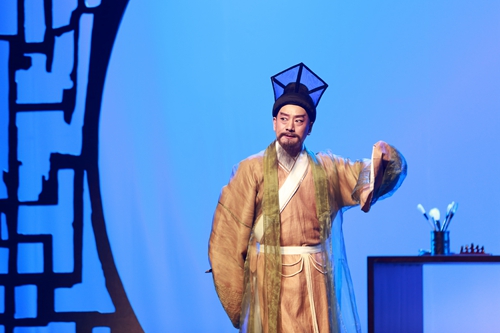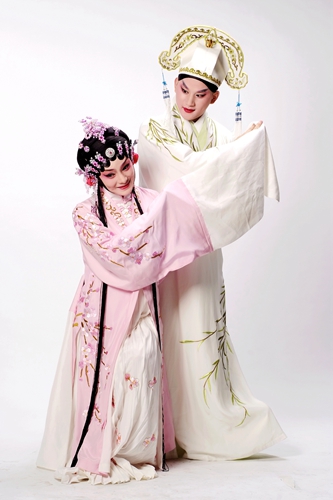|
In order to see the hometown troupe brings "Linchuan four dreams" home edition, Renmin University of China students from Jiangxi to Li Hao exhort account of Tsinghua University school, must help him pick up the tickets.
The day before, Jiangxi Fuzhou dialect version of "Linchuan four dreams" into the Tsinghua University, more than and 800 student tickets a day robbed, the organizers had a lot of additional temporary ticket. Then the performance in Peking University is also very popular, many students praise the wonderful performances, increase their understanding of Tang Xianzu, Chinese opera interest.
"The dream about as far as saying that traditional code of conduct, it is people waking thought", opera house, the great Ming Dynasty writer Tang Xianzu in the "dream" ambition, because "dream" was named, the creation of "Peony Pavilion" (aka "the resurrection") "Purple hairpin" "Nanke dream" "Handan" referred to as the "Linchuan four dreams", become the precious heritage of culture and art China. Tang Xianzu (1550 - 1616), meaning, if still, No. Hairuo Shi, Qingyuan road. Jiangxi, Linchuan (now Fuzhou). His personality upright, not tufthunting, career flow: he too often Dr. Nanjing, James palace, temple priest in charge of the Secretary, after being relegated to the Guangdong Xuwen code of history, as the Zhejiang county magistrate in Suichang. In 1598, he returned to Linchuan in Guaguanguiqu, Wenchang, built "Yu Ming Tang", wrote "the Peony Pavilion".....  Tang Xianzu in "Linchuan four dreams"
Fuzhou is known as "town of talent" and "cultural state" reputation, there are Yan Shu, Yan Jidao, Zeng Gong, Wang Anshi, Lu Jiuyuan and other famous scholar Ju gong. Tang Xianzu's life has spent 52 years in Fuzhou, "Linchuan four dreams" three half completed in Fuzhou, which makes Fuzhou become a drama dream place. Jiangxi city in Fuzhou province a row version of "Linchuan four dreams" accent with the closest to Tang Xianzu's first tune (Xu River, can be seen as high) a reduction to 400 years ago, the classic.
"Linchuan four dreams" accent version of "Four Dreams" and Tang Xianzu's life experiences are woven together around him in the hall, officialdom ups and downs, deduce his "emotion", "dream of yearning", show his form creation thought and mentality. Chinese Federation vice president Liao Ben praised the play's ingenious, "through the four stages of Tang Xianzu's life, his four drama series, reflects his perception of life, the pursuit of love, the expectation of life and dream", for the general audience understanding of Tang Xianzu and his works are of great help. "We are from the" Linchuan four dreams "in the" Purple hairpin "select [money] [blame drunk man named Xiao dream] [idle window], from the" Peony Pavilion "select [] [] [Ming Garden Pavilion] [] to retrogradation, from" Nanke dream "[excerpt and search [love] [] to do], from" Handan "to select [] [] [] Xian and students together to perform." Talking about the modern drama construction method of the mind, screenwriter Cao Lusheng said, in the plot structure of admiral Tang Xianzu as the main characters throughout the play, Huang Shanke, Hu Qi Xuan, judge Jackson and Lv Dongbin at the same time as the narrator, the ZheZiXi outside of the story, the tail and the link order is full of modern breath free open form. 
Stills in "Linchuan four dreams - the purple hairpin"
Peking University professor Li Jian believes that this show not only the text structure of creative, and Tang Xianzu's hometown is also rich tune performed Tang Xianzu's stage performance. Tang Xianzu in the "Yihuang County Qingyuan" drama God Temple of Yihuang County of Fuzhou city was recorded along the popular tune. From the historical literature, conclude that Tang Xianzu's "creator" four dreams of Linchuan was formed to sing salt chamber should be to the music. For simplicity the original show more than and 400 years ago, Tang Gong plays first, from the creators of national non excavated salt cavity as the main body "the singing of intangible cultural heritage in Fuzhou Xu River high pitched tune, in the music form, the classical and modern salt cavity complementary fused symphony.
"This show distinctive singing, choral choreography and warm atmosphere, concise and lyrical color and style," the Central Party School of history department professor Mei Jingzhong said, is magnificent, highlighting the feelings of watching the drama. He also believes that the performance of the play in the University, will play a certain role of classics.
In the theater with Tang Gong dream, in the study of the literary life of goods. "Linchuan four dreams" reflects Tang Xianzu's thought of "respecting life". In the hierarchy of the feudal dynasty, Tang Xianzu is valuable harbouring the thought, whether in power or creation, put in the first place. The Xuwen code of history, Tang Xianzu education school, promoting moral education and refinement, he founded your health college, and expounds their "your health", "the world's students are valuable when" ("Tang Xianzu said," Your Health College) "heaven and earth is expensive, only this universe. The waves all day long drum, who learns your love "(Tang Xianzu" Xuwen of your college "). He believes that people are the most valuable, everyone has the right to live and develop.
"Love" is "a reflection of your students" thinking, in the "first dream" "Purple hairpin", he "is born alive, who can be ruthless" feelings, through the description of Li Yi and Huo Xiaoyu with the fate of love story, to express the call for humanity. In the legendary drama "the Peony Pavilion", he with "I do not know the situation, deeply attached. Living can die, death can be born "as a clue, conceived by Liu Mengmei and Du Liniang love story, reveals the meaning of life.
Always pay attention to the liberation and development of the human personality, therefore, Tang Xianzu's "Linchuan four dreams" is not a simple love story, but into the thinking of life.
"All things have their own feelings," Tang Xianzu died 400 years later today, in the face of his left behind the precious cultural wealth, how to inherit? How to carry forward? This is an era of answer.
|







